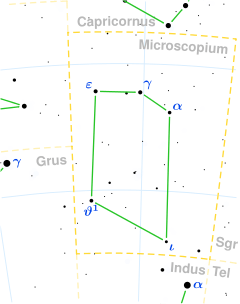Theta2 Microscopii
Theta2 Microscopii (θ2 Mic) is a class A0III[3] (white giant) star in the constellation Microscopium. Its apparent magnitude is 5.76[2] and it is approximately 390 light years away based on parallax.[1] It is an Ap star, a chemically peculiar star with unusually strong metallic spectral lines.[8]
| Observation data Epoch J2000 Equinox J2000 | |
|---|---|
| Constellation | Microscopium |
| Right ascension | 21h 24m 24.81796s[1] |
| Declination | −41° 00′ 24.1033″[1] |
| Apparent magnitude (V) | 5.76[2] |
| Characteristics | |
| Spectral type | A0IIIpSi[3] |
| U−B color index | -0.21[4] |
| B−V color index | -0.04[5] |
| Astrometry | |
| Radial velocity (Rv) | +8.00[6] km/s |
| Proper motion (μ) | RA: +24.64[1] mas/yr Dec.: -0.25[1] mas/yr |
| Parallax (π) | 8.35 ± 0.70[1] mas |
| Distance | 390 ± 30 ly (120 ± 10 pc) |
| Absolute magnitude (MV) | 0.39[2] |
| Details | |
| Luminosity | 78.22[2] L☉ |
| Temperature | 10,378[7] K |
| Other designations | |
| Database references | |
| SIMBAD | data |
The main star is reported as an astrometric binary, with two components A (6.24 mag) and B (6.88 mag) orbiting with a semimajor axis of 0.836" and eccentricity 0.201, with a period 464.66 years.[9] A more distant companion, C, has a separation around 78.4" and magnitude 10.3.[10]
References
- Van Leeuwen, F. (2007). "Validation of the new Hipparcos reduction". Astronomy and Astrophysics. 474 (2): 653. arXiv:0708.1752. Bibcode:2007A&A...474..653V. doi:10.1051/0004-6361:20078357. Vizier catalog entry
- Anderson, E.; Francis, Ch. (2012). "XHIP: An extended hipparcos compilation". Astronomy Letters. 38 (5): 331. arXiv:1108.4971. Bibcode:2012AstL...38..331A. doi:10.1134/S1063773712050015. Vizier catalog entry
- Hoffleit, D.; Warren, W. H. (1995). "VizieR Online Data Catalog: Bright Star Catalogue, 5th Revised Ed. (Hoffleit+, 1991)". VizieR On-line Data Catalog: V/50. Originally Published in: 1964BS....C......0H. 5050. Bibcode:1995yCat.5050....0H.
- Mermilliod, J. C. (2006). "VizieR Online Data Catalog: Homogeneous Means in the UBV System (Mermilliod 1991)". VizieR On-line Data Catalog: II/168. Originally Published in: Institut d'Astronomie. 2168. Bibcode:2006yCat.2168....0M.Vizier catalog entry
- Mallama, A. (2014). "Sloan Magnitudes for the Brightest Stars". The Journal of the American Association of Variable Star Observers. 42: 443. Bibcode:2014JAVSO..42..443M.Vizier catalog entry
- Kharchenko, N.V.; Scholz, R.-D.; Piskunov, A.E.; Röser, S.; Schilbach, E. (2007). "Astrophysical supplements to the ASCC-2.5: Ia. Radial velocities of ∼55000 stars and mean radial velocities of 516 Galactic open clusters and associations". Astronomische Nachrichten. 328 (9): 889. arXiv:0705.0878. Bibcode:2007AN....328..889K. doi:10.1002/asna.200710776.
- McDonald, I.; Zijlstra, A. A.; Boyer, M. L. (2012). "Fundamental parameters and infrared excesses of Hipparcos stars". Monthly Notices of the Royal Astronomical Society. 427: 343. arXiv:1208.2037. Bibcode:2012MNRAS.427..343M. doi:10.1111/j.1365-2966.2012.21873.x. Vizier catalog entry
- Renson, P.; Manfroid, J. (2009). "Catalogue of Ap, HGMN and Am stars". Astronomy and Astrophysics. 498 (3): 961. Bibcode:2009A&A...498..961R. doi:10.1051/0004-6361/200810788.
- Malkov, O. Yu.; Tamazian, V. S.; Docobo, J. A.; Chulkov, D. A. (2012). "Dynamical masses of a selected sample of orbital binaries". Astronomy & Astrophysics. 546: A69. Bibcode:2012A&A...546A..69M. doi:10.1051/0004-6361/201219774. Vizier catalog entry
- Mason, Brian D.; Wycoff, Gary L.; Hartkopf, William I.; Douglass, Geoffrey G.; Worley, Charles E. (2001). "The 2001 US Naval Observatory Double Star CD-ROM. I. The Washington Double Star Catalog". The Astronomical Journal. 122 (6): 3466. Bibcode:2001AJ....122.3466M. doi:10.1086/323920. Vizier catalog entry
This article is issued from Wikipedia. The text is licensed under Creative Commons - Attribution - Sharealike. Additional terms may apply for the media files.
